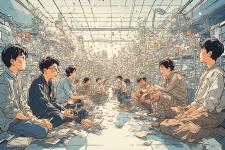World
Full Circle of Ideas | The Blueprint of Modern Progress built by Ancient Civilizations
Posted on 3 mins
Imagine a world where the very ideas that make modern life possible—policy, science, economy, culture—simply didn’t exist within the faiths that now dominate swaths of our planet. That might seem unthinkable, yet history shows that the foundational concepts underpinning our societies were forged elsewhere: in the city-states and republics of the Mediterranean, in the rich intellectual ferment of ancient Persia and India. When Rome coined words like “politics” and “policy,” and later when Greco-Roman thinkers wrestled with the birth of natural philosophy, they were laying bricks for a future civilization that their spiritual heirs would later claim as their own—often without acknowledging the origin.
The Great Outsourcing Shift | How Federal Reserve Policy is Reshaping Global Tech Markets
Posted on 7 mins
TLDR - Summary: Analyzing recent market changes and reshaping industries and the human factors involved in it presents an economic complexity that goes beyond textbook theories. Competitive advantages are temporary - What seems permanent (like India’s IT dominance) can shift rapidly Monetary policy is as much psychology as economics - Expectations often matter more than fundamentals Perfect systems don’t exist - All economic frameworks involve trade-offs Money is a tool, not wealth - The goal should be facilitating productive exchange, not monetary purity Human behavior drives economic outcomes - Any system that ignores human psychology is doomed to fail The Great Outsourcing Shift: How Federal Reserve Policy is Reshaping Global Tech Markets Southeast Asia is emerging as the new frontier for IT outsourcing, with Vietnam and the Philippines positioning themselves as serious competitors to India’s long-standing dominance in the global services economy.
The Manufacturing Imperative | Why India's Development Path Diverges from East Asian Success
Posted on 12 mins
TLDR – Summary: Based on Joe Studwell’s How Asia Works, this article argues India skipped the “land → manufacturing → finance” formula that drove East Asian growth. East Asian model: Land reform boosted small-farm output, state-led export manufacturing forced global competition, and financial control funneled capital into industry. India’s detour: Post-1991 liberalization built an IT/BPO powerhouse (<1% workforce) instead of a broad manufacturing base (~14% vs. 30% in East Asia).
Embracing Pragmatic Self-Interest | A Realistic Approach to Modern Society and Politics
Posted on 4 mins
TLDR - Summary: Society could improve by encouraging honest self-interest rather than unrealistic ideals of universal morality. Many genuinely follow altruistic values, often at their own expense, while others openly prioritize their interests—leading to frustration and betrayal. When everyone is upfront about their goals, interactions could become more transparent and mutually beneficial. Cohesive minority groups already thrive by openly advocating for their own interests, while the fragmented majority often falls short due to misplaced guilt-driven values.